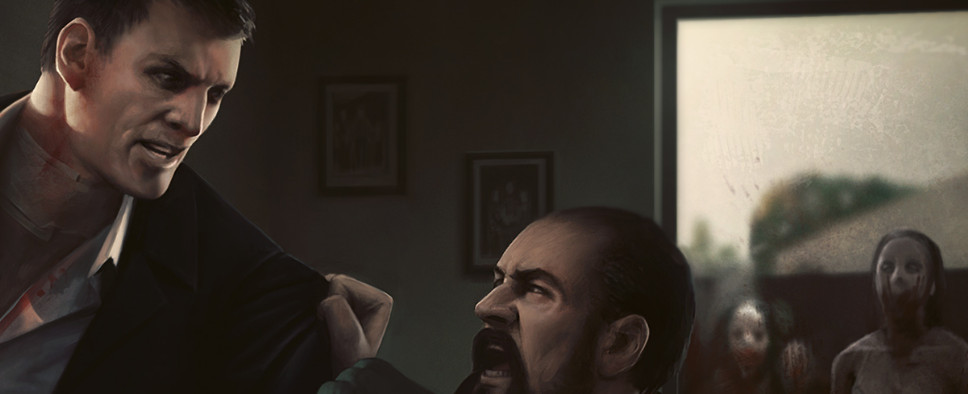Dead State: Reanimated Review
-
Category: ReviewsHits: 20121

Article Index
Base Management
When the game starts out, you're hiding in the basement of a school. You have a working generator to produce electricity (at the cost of fuel), plus a refrigerator and toilets, but that's it. So the first thing you have to do is repair the fence around the school to prevent zombies from getting in. This requires 100 parts, plus people to do the repairs. You assign jobs to people using the "job board" in the cafeteria. Repairs don't usually take very long, but other projects might take hundreds of worker hours, and so you have to move people around the job board every day (including assigning up to four people to your scavenging party).
There are lots of things you can build at the school: a watchtower (to defend the fence when it's attacked), a garage (where you can repair a car for use by your scavengers), a science lab and a workshop (where you can construct or modify items, like a silencer for a 9mm pistol), a chicken coop and a greenhouse (where you can produce your own food), a recreation room (where people can improve their mood), an infirmary (where you can heal your wounded), and more.
To populate and build these structures, you can recruit somewhere around 50 people to join you. These people have personalities and skills, and you have to figure out the best way to use them. For example, some people might have combat skills and nothing else, making them perfect for your scavenging party, but others might be reluctant to go outside (and panic at the first sign of trouble), or have a particular job preference in the school, or work poorly with others.
Unfortunately, the characters are a disappointment. There isn't a lot of depth to them -- you get a short conversation with them when you first meet them, and then they usually generate a short story arc later, but their total dialogue time is only about five minutes each -- and while characters might complain about things or get into disputes, they're ridiculously easy to manage if you have any points in the Negotiation or Leadership skills. I'm guessing Double Bear wanted character management to be an important part of the game, but the characters are so easy to deal with and have such little depth that random recruits (a la the X-Com games) probably would have worked just as well.
Along with recruiting allies and giving them work to do, you also have to keep them happy. Each character has a mood, and the school as a whole has a morale as well. A character's mood is affected by their job, the decisions you make as a leader, and the morale of the school. You can also give characters special luxury items to make them happier. The morale of the school is affected by the number of working rooms and facilities you have, and by the amount of goods (especially luxuries) that you bring in when scavenging.
In the same vein as managing characters, I didn't have any trouble keeping moods or morale high. There are so many supplies to scavenge that it's tough not to generate a positive morale each day, and I found so many luxury items that it was easy to keep people happy. I even had luxury items left over that I never got around to handing out. There just wasn't any need. And so base management as a whole isn't the highlight of the game. Double Bear really needed to do something to make it more difficult or interesting.
Campaign
Dead State doesn't have much in the way of a campaign, at least story-wise. It's more of a sandbox game where you're just meant to go out exploring while recruiting people and building up your base. The places you visit -- including shopping malls, residential neighborhoods, hospitals, and even a miniature golf course -- are interesting enough, and there are also lots of items for you to find, people for you to meet, and upgrades for you to construct, so the "4X" elements of the game work just fine.
But Dead State isn't a 4X game. It's an RPG, which means it needs a concrete way to end -- preferably without everybody dying -- and Double Bear failed at this miserably. Most RPGs conclude with a big boss fight, but that doesn't work well for a zombie RPG, and Double Bear's solution both comes way out of left field, and comes too late.


